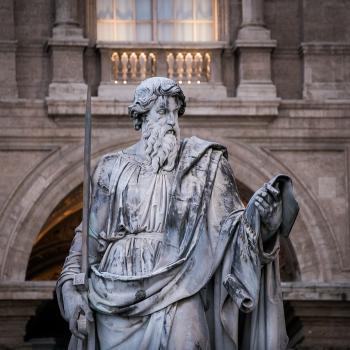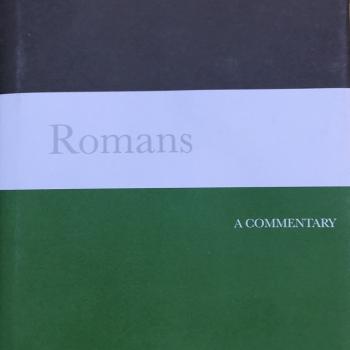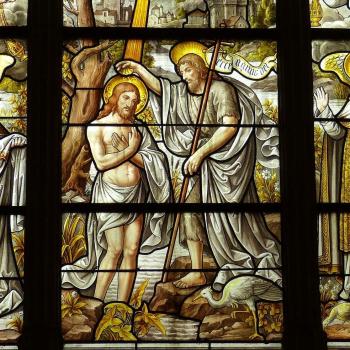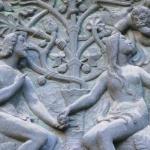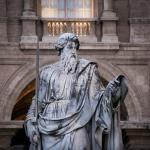Do you believe in angels? Those of Judeo-Christian faith normally do, whether by personal experience or, much more commonly, because they read about angels in the Bible. The word angel commonly identifies a supernatural being who plays a mediating role as a messenger or assistant between God and humans. In the Old Testament, the Hebrew word for angel is mal’ak, meaning “messenger.” In New Testament Greek the word is angelos.
We should recognize from the outset that angels are not mediators of salvation—Christ is the only mediator in this sense (1 Timothy 2:5). Christ reconciles humans to God and makes them God’s children (Romans 5:8–11); angels assist and minister to humans at God’s direction.
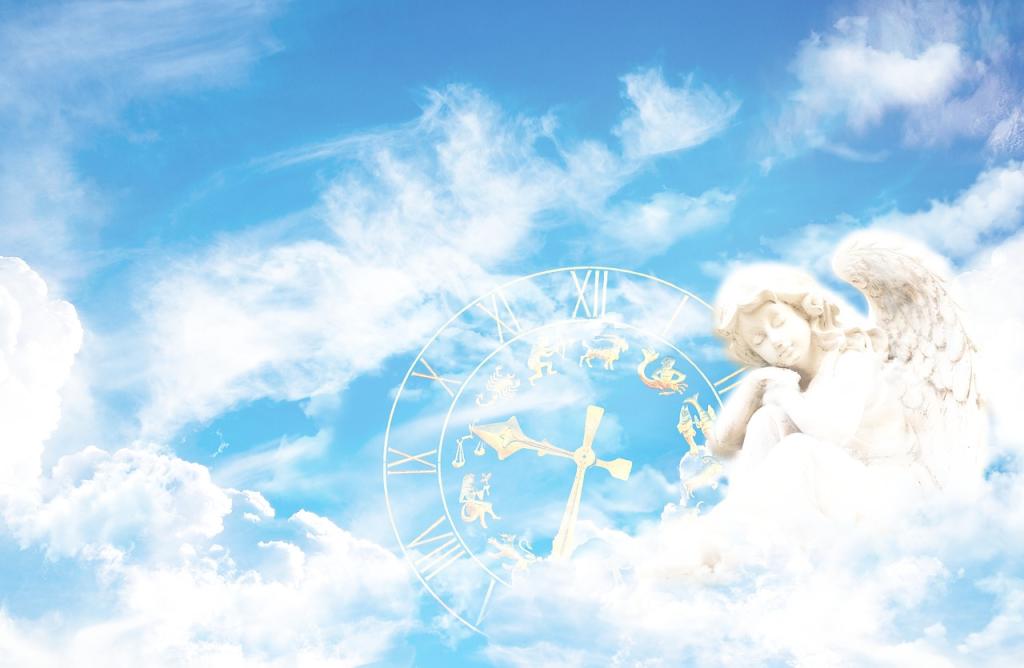
Perhaps the greatest speculations on the nature of angels came from the Dominican monk, Thomas Aquinas (1225–74), who earned the title, Doctor Angelicus. Aquinas answered 118 questions about the nature and attributes of angels and provided a basic definition of angels: “purely spiritual, intellectual and non-corporeal creatures, with `substances.’”[1]
Karl Barth calls Aquinas’s work, Summa Contra Gentiles “probably the greatest angelogue of all Church history.” However, he considers it a work of philosophy rather than theology, and he claims, “In its misguidedness we can compare it only with the foolish explanations which many modern theologians have given for their complete scepticism or indifference to the whole problem [of angels]” (Church Dogmatic, 3:391–92). Apparently Barth would blame Aquinas for the modernists’ mocking assertion that medieval theologians spent their time pursuing silly questions, such as, “How many angels can dance on the head of a pin?”
We will discuss six characteristics of the angels based on Jewish and Christian sources.
-
Angels are spirits
Like God, angels are spirits (invisible supra-material essences) who are not limited by the physical constraints put on humans (Hebrews 1:14). For one thing, angels do not die (Luke 20:36).
Thomas Aquinas claims that angels are able to take on the physical appearances of eating, talking, and so forth, even though they are not actually fulfilling such activities (Summa Contra Gentiles 50.5; 51.3; see Tobit 12.19; Philo Quaestiones in Genesis 4.9; Josephus Antiquities of the Jews 1.11.2). If they are spirits, however, one wonders how they could have digestive systems to eat!
Nevertheless, angels can interact with the material world. For example, the angel at Christ’s resurrection is portrayed as having no problem removing the heavy stone that sealed Christ’s tomb (Matthew 28:2; Mark 16:3-4).
Hebrews 1:7 (“who maketh his angels spirits, and his ministers a flame of fire,” KJV) is often used as a proof text supporting the spiritual nature of angels. However, a better rendering of this text is “He [God] makes his angels winds . . .” (compare Ps 104:4). In the context of Hebrews 1, this passage contrasts the subordinate and transitory nature of angels (portrayed as “winds” and “fire”) with the superior and permanent nature of Christ (Heb 1:4–6, 8–13). In one Jewish tradition the angels declare, “God changes us every hour . . . sometimes he makes us fire, at other times wind” (Yalkut Shimeoni 2.11.3; compare 2 Esdras 8:21; 2 Apocalypse of Baruch 21.6; 48.8).
-
Angels are “super” beings
Angels are “super” in the sense of having greater abilities than humans. In Scripture, we find them opening prison doors to free captives (Acts 5:19; 12:5–11), they reveal messages from God (Acts 10:3–4; 23:9; 27:23), and they can bring physical judgment on the wicked (Acts 12:23; cf. Genesis 19:10–11).
In Revelation 7:1, John depicts a symbolic picture of four angels that hold the four winds of the earth. This perhaps implies a Jewish belief that angels have power over nature (2 Enoch 5.1). Whether angels can actually control weather and winds, though, seems to fly in the face of what we know scientifically. Then again, if angels perform miracles, a miracle is supernatural and does not necessarily need to conform to what we know about science. It is not clear whether angels perform superhuman feats by their own power or whether they are specially empowered by God for the occasion. Whatever the case, benevolent angels act in harmony with the will of God.
-
Angels are personal beings
Unlike earthquakes, tornadoes, radar and other impersonal forces, angels are intelligent beings. They are not portrayed in Scripture as God’s spiritual robots; they have intellect, emotion and will.
Regarding intellect, they have wisdom and can discern between good and evil (2 Samuel 14:1–20; 19:27). It is said that they long to understand the complete plan of God’s redemption (1 Peter 1:10–12; Ephesians 3:10).
Concerning emotion, they rejoice over God’s creation and over one sinner who repents (Job 38:7; Luke 15:7, 10). In at least one Jewish tradition they grieve over those who reject the message of salvation (Pseudo-Philo, Liber Antiquitatum Biblicarum, 19.12-16). Aquinas, however, claims that although angels can rejoice, they cannot weep. They cannot experience sorrow and pain because they are in a state of heavenly bliss (Summa Contra Gentiles 113.7).
Regarding volition, angels choose to obey God’s word (Ps 103:20; Rev 22:8–9), although some who are considered fallen angels have chosen to disobey God (Jude 6).
-
Angels are holy beings
Angels are sometimes called “holy ones” (Daniel 4:13, 17; Jude 14; Revelation 14:10; Dead Sea Scrolls: 1QH 3.22; 4.25; 11.12; 1QM 1.10-11; 14.15-16). Although we read that they clothe themselves with glory and splendor (Luke 2:9; 24:4–5) and they have access to the heavenly realm (Genesis 28:12; Luke 2:13–15; John 1:51), their holiness comes from God.
In Scripture angels worship God alone as the absolutely Holy One (Job 4:18–19; 15:15).[2] The seraphim angels, for example, cry “holy, holy, holy” before the throne of the Almighty (Isaiah 6:2–3; Revelation 4:8).
-
Angels are not God
The Bible declares that there is only one God, and God alone deserves our devotion and worship (1 Corinthians 8:1–6; Galatians 4:8; Matthew 4:8–10; Isaiah 41:10–11). Angels are inferior to God and do not, as far as we can determine, have God’s attributes of omnipotence (all-powerful), omniscience (all-knowing) and omnipresence (everywhere present).
Thomas Aquinas argued that angels must always be at a respective point in time and only one angel can be at any one location at one time. Like other creatures, they must move about from one place to another (Summa Contra Gentiles 50.3; 52–53). The precise nature of angels in reference to space and time, however, is very difficult to decipher. If angels are spirits, are they not extradimensional beings that are not subject to the rules of physics that apply to all human beings? This is speculative. One thing is clear—we are to worship and pray to God, not angels.
-
Angels do various benevolent works
In Scripture, we see that angels reveal God’s will to human (Acts 27: 23–25; Numbers 22:31–35; etc.). They are involved in the final affairs of the world as seen repeatedly in the Book of Revelation. Also, they minister to people (Hebrews 1:14; Luke 22:43), and they are able to perform miracles (Acts 5:19; 12:7–11; Daniel 3:25; 6:22).
* * *
As the “National Be an Angel Day” quickly approaches (August 22), may we ponder on the characteristics of angels.
Notes
[1] This summarized definition of Aquinas’s view on angels comes from Karl Barth in Church Dogmatics (Edinburgh: T & T Clark, 1960), 3/3:391. For more about angels, see B. J. Oropeza, 99 Answers to Questions about Angels, Demons, and Spiritual Warfare, from which much of this information is derived.
[2] Some early church traditions speculated that the angels are perfected by the Holy Spirit (Basil Homilies 32.4).









